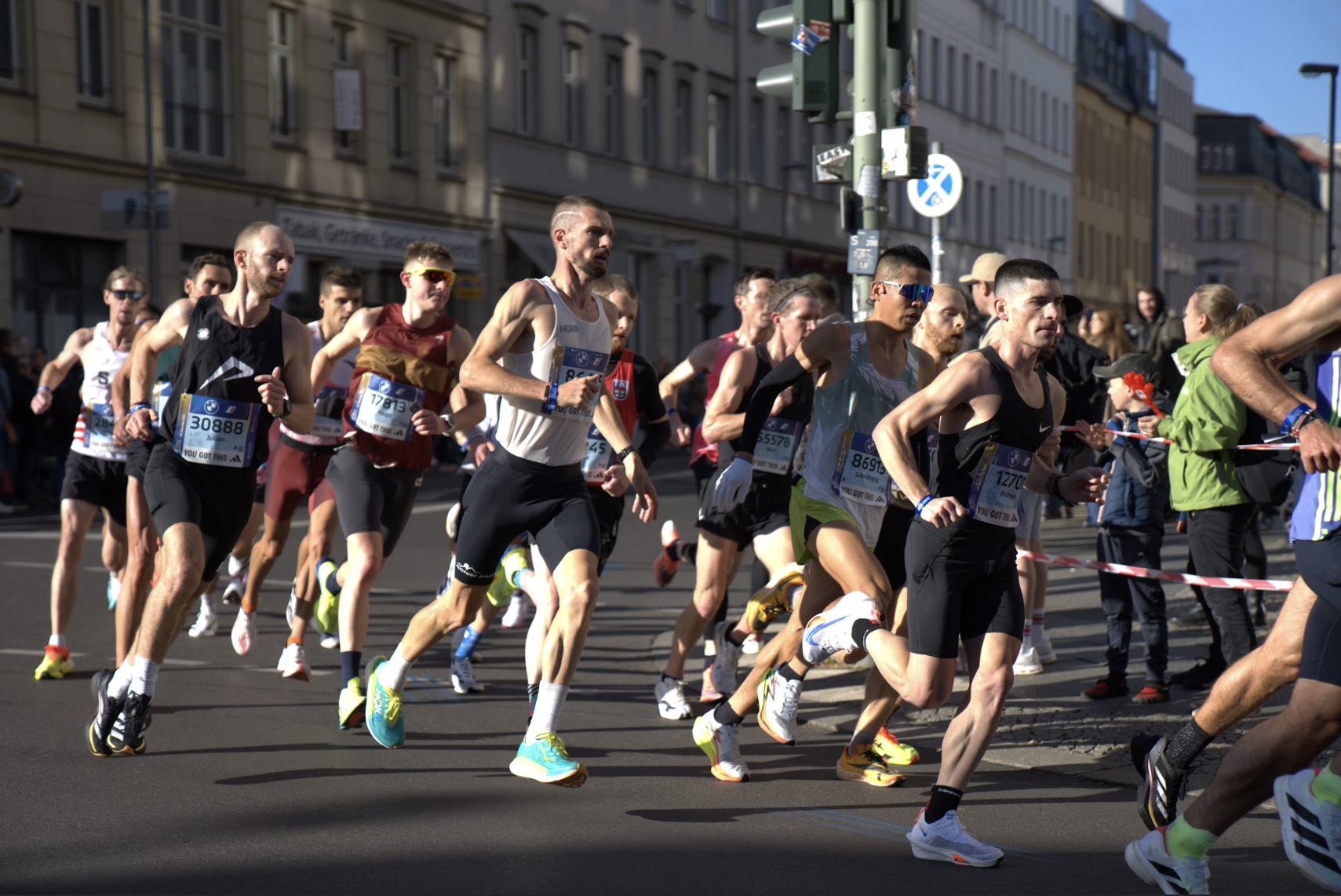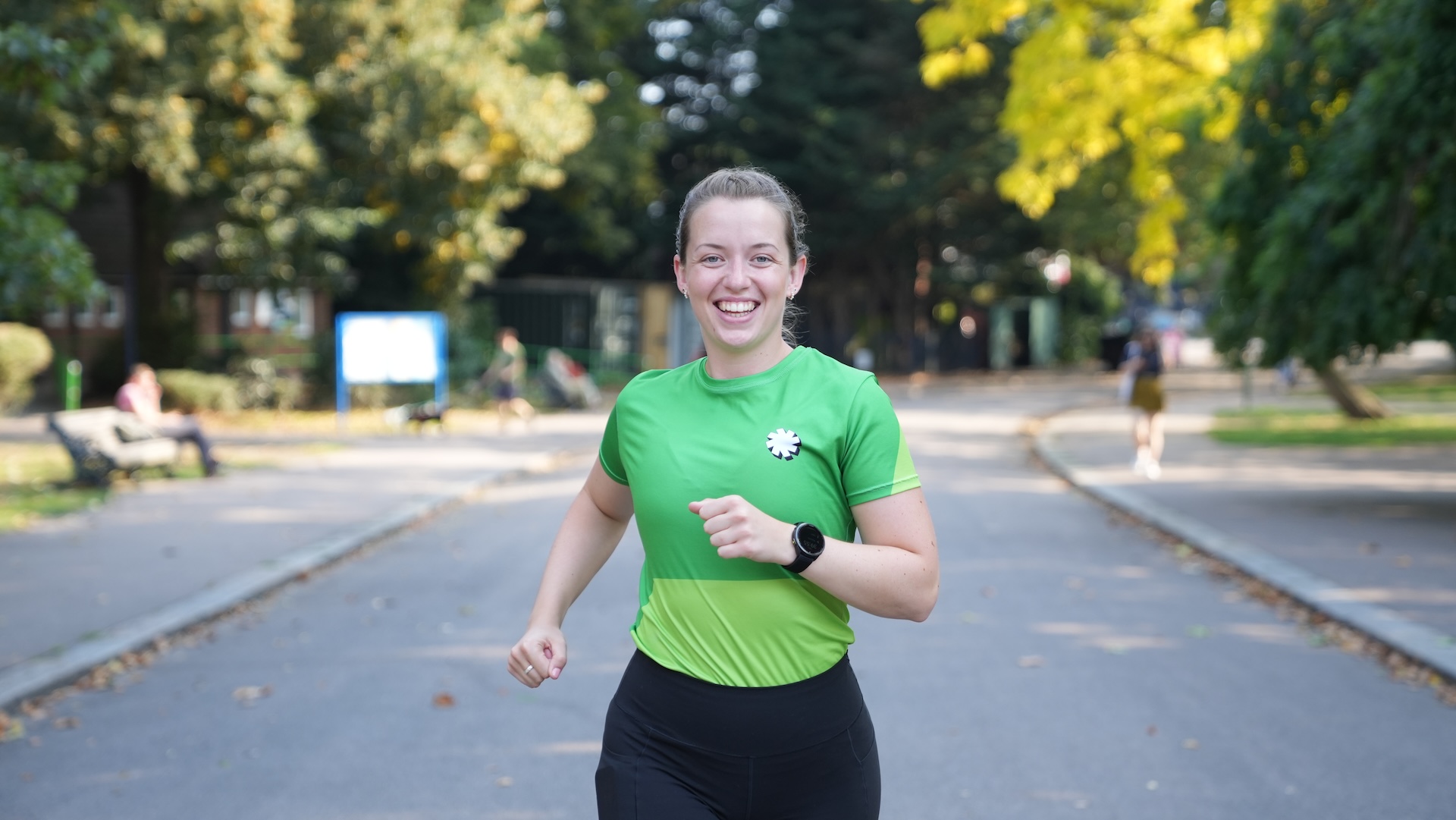How Long Does It Take To Train For A Marathon?

Do you want to run a marathon? Whether you’re new to running, building up from 5km or 10km, or you’re looking to beat your current marathon time, we’ve got everything you need to know about how long it takes to train to run a marathon.
And once you’ve finished your marathon, then here’s how long it takes to recover from running a marathon.
We’re looking at:
- How long is a marathon?
- How far should I be able to run before starting marathon training?
- How long does it take to train for a marathon?
- Why does marathon training take so long?
- How far do you run each week in marathon training?
- Can you run a marathon without training?
- Top tips on training for a marathon
- What does a marathon training plan look like?
HOW LONG IS A MARATHON?
A marathon is 26.2 miles or 42.2km. That’s a LONG way, and it can take a long time to feel ready to run that far.
HOW FAR SHOULD I BE ABLE TO RUN BEFORE STARTING MARATHON TRAINING?
You should ideally be able to run comfortably and continuously for around one hour, and be able to run three times per week, before beginning marathon training.
If you cannot run for one hour, or don’t yet run regularly, then you will need to add in a few more weeks or months to build up to that distance before starting on a marathon training plan.
HOW LONG DOES IT TAKE TO TRAIN FOR A MARATHON?
This all depends on how much you currently run, but the minimum time to train for a marathon is 14-20 weeks.
If you are new to running and want to train for a marathon, then it may take you as long as one year to go from couch to 42km. This time will allow you to slowly and safely build up to running 5km and then 10km, which will take 12-16 weeks (or more), and then it’s a good idea to train towards a half marathon. After this, you could begin marathon training.
If you’ve signed up for a race which is less than one year away then six to nine months may be enough time, but be careful to gradually increase the amount you run and try to be as consistent as possible with your training.
If you can run for one hour continuously or around 10km then 14-16 weeks is the minimum time that you should allow for marathon training, and 16-20 weeks is more advisable to allow you enough time to safely increase your training volume.
Most experienced runners and professional marathon runners take 12-16 weeks to train for a marathon, and they begin those training blocks with a good base of fitness.
WHY DOES MARATHON TRAINING TAKE SO LONG?
You need to gradually increase the distance that you run during marathon training. If you take shortcuts, or try to increase your running and intensity too quickly, then you are more likely to get injured, which will slow down (or end) the whole process.
If you can run for 60 minutes before you begin, then adding 10 minutes to your long run each week will see you reaching a three-hour long run after 12 weeks, then you can have time to taper for your race. Now, that’s not exactly how you’ll train, but that shows how we need so much time to add on the training distances.
Running 26.2 miles takes a lot of fitness, endurance and strength. That’s in the muscles and also connective tissue like the ligaments and tendons. Gradually adding to your long runs, and adding in shorter fast intervals, will help to create the strength you need to run a marathon.
HOW FAR DO YOU RUN EACH WEEK IN MARATHON TRAINING?
In the first weeks of your marathon training, you’ll likely run 15-20 miles / 24-32km per week spread out across four runs.
The average peak weekly distance for people finishing in around four hours is 35 miles / 57km. This is a good distance for all runners to aim for as a minimum when marathon training.
Runners aiming to go under three hours will often run 50-70 miles / 80-115km per week, typically over five or six runs.
CAN YOU RUN A MARATHON WITHOUT TRAINING?
Despite videos you see on social media, we definitely do not advise running a marathon without training.
A marathon is a huge amount of effort and attempting to do it without having done the right training can lead to injury (plus it’s going to be really, really hard!).
TOP TIPS FOR TRAINING FOR A MARATHON
- Follow a proper training plan using an app like Runna, or work with a coach, as these can give you the right structure to a training block and can adjust with you while you train, especially if you begin to struggle
- Be as consistent as possible with your training, but don’t be afraid to take extra time off if you need it or if you feel niggles (and don’t try to catch up missed runs)
- Learn the best ways to fuel and hydrate for your runs, and then be consistent with refuelling after running. You need a lot of energy for your training, so focus on simple carbs before running, and consuming both carbs and protein to help you recover
- Look to add cross-training (like swimming, cycling or elliptical) into your training, and do one or two strength workouts per week which include things like squats, deadlifts and lunges, plus core exercises
- Work on recovery and different techniques which can work for you like foam rolling, stretching and yoga
WHAT DOES A MARATHON TRAINING PLAN LOOK LIKE?
We have a 16-week training plan available on our website and it has you doing four runs per week.
The first week begins with a 30-minute easy run, a 5 mile / 8km easy/steady run with strides, an interval workout and a 60-minute long run. If that amount of running is too much for you, then you should build up until you feel comfortable completing those runs.
That first week is typical of the structure of most marathon training plans which will consist of one or two easy runs, one or two harder days (intervals, tempos or threshold runs) and a long run, plus two or three rest days.
As you progress through the training, the long runs get longer and the faster runs get faster, plus you’ll begin to train more specifically at the pace you hope to run during your marathon.
***
If you’ve run marathons, then how long did you train for?


























Running News
Ingebrigtsen Stars at World Athletics Indoor Championships 2025 – Plus All The Winners!
Sam Ruthe Is First 15-Year-Old To Run A Four-Minute Mile!
Eliud Kipchoge Will Run The 2025 Sydney Marathon!